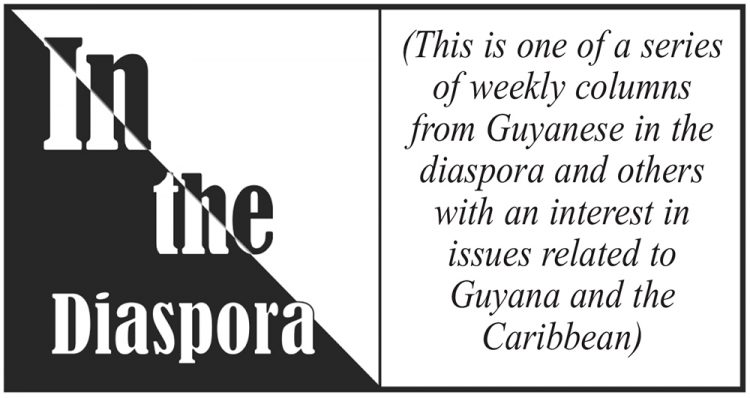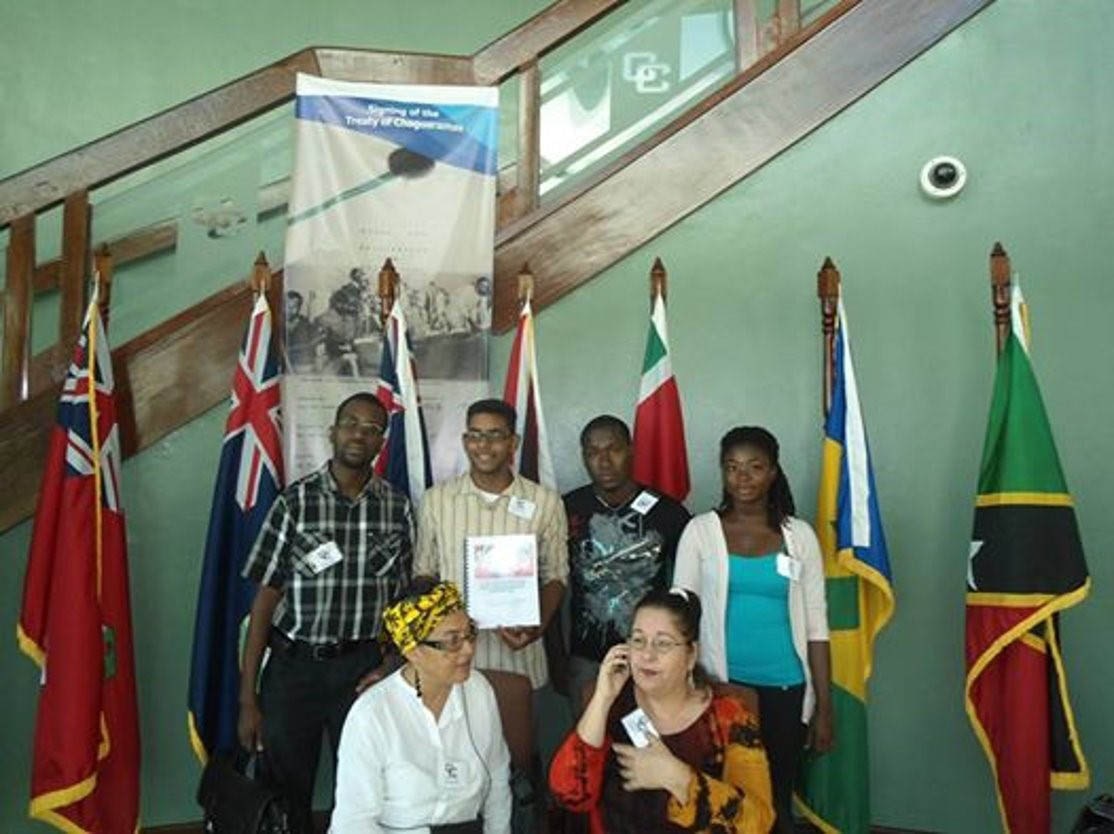 A Call for Signatures, A Call for CARICOM Action
A Call for Signatures, A Call for CARICOM Action
Editor’s Note: In the past week, Guyanese have been organizing pickets demonstrating the importance of regional and international solidarity that does not answer to the geopolitical imperatives of the powerful. Today at midday, the public is invited to join a picket outside the Office of the President in support of Palestine. Organisers say that the call is for President Irfaan Ali to suspend all diplomatic and economic ties with Israel in light of their current military intervention against civilians in Gaza, in an attempt to stop the carnage. They emphasize that this is not an anti-Israel picket or to condone the killing of Israeli civilians by Hamas; the desire is always for peace in the Middle East. However, the actions of the Israeli government which promote oppression of the Palestinian people must be opposed and stopped.
Last week Tuesday, the Haiti Support Group-Guyana staged a public protest outside of the CARICOM Headquarters against the impending CARICOM-endorsed invasion of Ayiti by a Kenyan police force, an invasion to be paid for by the US. That deployment has now been barred for two weeks by a Kenyan high court judge, in order to hear a challenge that was filed in the courts there. In a Washington Post report, Kenyan Interior Minister has since stated that “parliament’s approval should be sought before any troops are sent.”
Ten years ago, Caribbean peoples mobilized across the region in the wake of what can only be described as a racist and xenophobic Dominican Republic Supreme Court decision that effectively and retroactively stripped citizenship from hundreds of thousands of Dominicans of Haitian heritage. In Guyana that included a teach-in at the University of Guyana and the delivery of a petition to then Caricom Secretary-General Irwin LaRocque, demanding CARICOM take a strong stand on behalf of and with one of its member countries. Readers should remember that the Caricom Bureau (then chaired by Trinidad and Tobago Prime Minister Kamla Persad-Bissessar) condemned the ruling, and that this would likely not have happened without the pressure brought to bear on regional leaders by Caribbean people.
Today, we share a petition on the current situation in Haiti and in response to the latest UN occupation plan, that was developed by Guyanese elder Eusi Kwayana in consultation with a younger generation of Caribbean people. This week, a delegation of Guyanese plan to deliver the statement to the CARICOM Secretary-General, Dr. Carla Barnett. It is open for signatures at:
https://chng.it/LR5TSJPd4hIf you want your name to be made public in the petition that will be given to CARICOM, please sign “Free Haiti”; “Solidarity with Haiti” or any other message of support in the comment box which effectively signals consent to having your signatures public. We encourage readers to share this widely across the region.
This petition/open letter is a counterproposal for the gathering of forces instead of current United Nations (UN) policy toward Haiti. Signatories are asked to endorse broad consultation and a Caretaker government to guide transition out of the disturbing circumstances in Haiti. This counterproposal is in opposition to the policing action under Ariel Henry’s authority.
The grandfather clock of foreign armed intervention is ticking again, this time again for the republic of Haiti. Those inspired by the historical Haitian Revolution (1791-1803) must remind global citizens this is not a minor event for an obscure small territory in the Caribbean Sea. We must draw a line of steel between the Haiti, characterized as exhibiting perennial chaos, and the Haiti that has always had a large vision and been at the center of democratizing world civilization.
A conquered people who organized a powerful war of liberation against the slavery empires of the French, Spanish, and English, has also since 1915-1934 been intermittently occupied in the last 100 years by the USA. Haitians, women and men, have conducted profound experiments in self-government and expressed solidarity to both whites and people of colour on a world scale in their times of need. The signatories bear witness that Haiti has never been forgiven for its search for identity and autonomy.
On October 2, the UN Security Council adopted resolution 2699 (2023), clearing the way for a multilateral armed force into Haiti as the supposed means of solving what is described as a regime of disorder due to the activity of armed gangs in that country.
The public has not been offered by the august body of the UN an explanation of the origins and causes of this disorder. Hence it is no surprise that to many including those who signed this statement the situation is much like a team of medical experts prescribing deep surgery for a patient without letting the diagnosis be known. Before drafting this statement those who signed it have spent much time inquiring into the texture and present motion of Haitian society, which for many years has been denied the right of self-determination.
Some features of the UN resolution need to be recalled. Most noteworthy is the fact that 13 nation-states voted in favour and two abstained. The People’s Republic of China and the Russian Federation, which along with the UK, France, and the USA have the power of veto, abstained at the time of voting for this critical resolution of the Security Council. China and Russia had also abstained in 2011 when the UN Security Council voted to impose a no-fly-zone, leading to a USA led war against Libya.
The most recent resolution of the Security Council purports to authorize or invite armed intervention to pose as a police action into Haitian society. It seems to approve and welcome the offer of the government of Kenya to lead this intervention with a police force of 1000, an offer that was quickly approved by the USA in its pledge to contribute $100 million dollars to the implementation of this unfortunate mode of conflict resolution.
Though some are satisfied, some are disturbed in the Haitian and Caribbean community by Kenya’s role. Certainly, there is agreement among many that Kenya is fronting an initiative by the USA. But more is required of us.
We must remember that the CARICOM governments not only endorsed the intervention in Haiti. The smallest territories including St Lucia, Antigua & Barbuda, and Grenada are federated through the RSS (Regional Security Service) project.
The RSS proudly traces its history to taking part in the US invasion of Grenada in 1983 and claims to be a project of Pan Caribbean unity. Even the larger territories including Guyana, Jamaica, Trinidad and Barbados are affiliated.
The RSS has been trained by the US, UK, and Canada. Its major contemporary mandate for existence is to fight “gangs” and “firearms proliferation.” It is peculiar that we don’t hear much about the RSS at this moment of danger. Whatever their well-wishers say, all the CARICOM governments are taking part and are complicit in this policing action in Haiti. That is why the RSS exists. It might be renamed “the Rulers Security Service.”
The USA seems sensitive to not placing CARICOM RSS toward the front of this Haiti intervention – even though they have been trained explicitly among other things to fight gangs and firearms proliferation. They are of course concerned about protests close to home. Kenya’s taking of the initiative is also a grave and disturbing maneuver.
In our view, the UN organization has had a series of mishaps in its efforts to intervene in Haiti and is on the verge of implementing another project, the failure of which is even more predictable than those that have gone before.
It should be made clear that in this critique of UN activity, the signatories have doubts about the UN’s capacity to aid the Haitian people. This is consistent with vigilant global citizens who desire accountability and increasing power over our lives including in foreign affairs.
It is clear that the voices of Haitians who do not want intervention express serious concerns. Past policing actions in Haiti have been widely acknowledged as reasons for the Haitian masses to question UN prescriptions or designs for their delivery.
Before making any attempt at proposing alternative measures, the signatories affirm that the basic statutes of the UN organization and in particular the 1948 Universal Declaration of Human Rights that with their amendments appear to be reliable guidelines to be applied in the case of the disorders in Haiti.
Our first proposal is that the resolution of October 2 should be revisited for reconsideration and improvement in the light of the fact that there has been little or no consultation with formal or informal associations representing or reflecting the opinions of the mass of the population outside of government, official and pseudo-official positions.
It is therefore urged that in revisiting the resolution of October 2, the Secretary-General with the help of others should arrange for genuine consultations in Haiti, or at the site of the UN, with a cross-section of opinion reflecting what can be called, without a general election, the will of the people. This should be carried out at the expense of the United Nations.
The will of the people is not an easy standard to achieve but when it is considered that the future of Haitians of various strata, classes, opinions and of various generations is involved, all people of good will agree that making the effort, is a worthy endeavor.
It is our hope that what can emerge from such consultations, in the place of support for a transitional government headed by a controversial present office holder placed there by ill-considered intent expressed in high places, is a Caretaker government of plural origins. This Caretaker government should represent the widest possible cross-section of Haitian society. Such a Caretaker government of many strata, including women, men, and youth, not excluding the humblest, will have a far better likelihood of leading a transition to a society far more conducive than the present for growth and development of humanity in Haiti.
The resolution of the Security Council contains, so far as it is known, one element worthy not only of universal support but of strengthening and expansion. It is the proposal for an embargo on arms sold or delivered to Haiti. There are Haitians today who believe that the official security forces are unable to import or receive equipment they need to contend with gangs, whereas they experience it the gangs seem to have no difficulty obtaining weapons which they use for domestic terror.
There can be justifiable arguments against some of the recommendations in this statement. Yet on examination it will be found that the measures modestly recommended here will result in far less conflict, far less disorder, and far less arbitrariness in attempts to implement the Security Council’s resolution. It is hoped that this letter, this statement, offers new hope of coming to grips with the unfortunate developments in Haiti without a resort to, and reliance on, brute force, which is the logic of the present resolution we criticize. Hence, we have taken the liberty of offering this counter-proposal.

